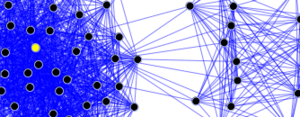 Image via Wikipedia"How might we engage students more deeply in ..."
Image via Wikipedia"How might we engage students more deeply in ..."Finish that sentence with any word you like; something to challenge yourself; something that might help you grow as a teacher.
Some possibilities: reading, mathematical thinking, the scientific method, writing, multiliterate expression, critical thinking, understanding bias, media literacy, etc.
Think about the second order principles of the discipline you teach; use one of those to fill in the blank above. (Examples of second-order concepts in the study of history can be found here and there.)
Spend some time this week thinking about and jotting down one or two second-order concepts, or organizing principles, of the content area(s) you teach. Do you think a focus on these "big ideas" might make for more powerful learning for your students or maybe give them a way to begin thinking about their learning more deeply?
How might you incorporate these ideas into your lessons in the coming school year?
Does thinking about these second-order concepts help you understand your content more deeply?
Is there a course you teach that doesn't have any second-order concepts that underpins the content?
Please share your list of one or two ideas in a tweet, blog, leave a comment here or anywhere and include this tag in it somewhere: #wpedagogy
If you can think of a discipline that has no second-order concepts (SoC) please share that too!
If all this turns out to be hard, don't worry, we'll dig into this a little more deeply next week. Start by thinking about this on your own. We'll figure out how to get help from other people next week.
(This series of posts inspired by Design Thinking for Educators.)




